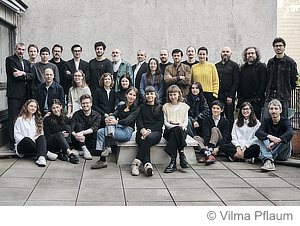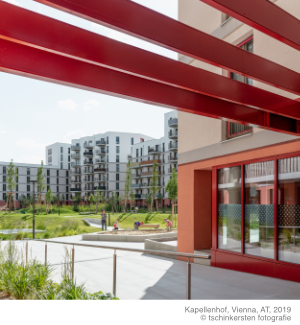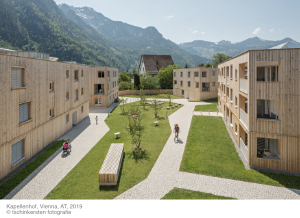 |
 |
 |
 |
 |
 |
| |
 |
|
 |
 |
 |
  |
  |
 |
 |
 |
 |
|
 |
 |
Feld72
|
| nazionalità:
austriaca |
|
 |
|
 |
 |
|
|
| Schottenfeldgasse 72 |
|
1070 Wien [Vienna] -
Austria [Österreich] |
|
Tel: +43.1.9240499
- Fax: +43.1.9240499.99
|
|
 |
|
 |
 |
|
|
| Paterbichl 2 |
|
39052 Kaltern/Caldaro (BZ) -
Italia |
|
Tel: +39.3403479855
|
|
 |
|
 |
Composizione dello studio per l'opera:
Abitazioni in Appiano / Wohnanlage Eppan |
|
 |
 |
Anne Catherine Fleith
* Colmar, Francia [France], 1975
nazionalità: francese |
 |
 |
 |
 |
Richard Scheich
* Launceston (TAS), Australia, 1972
nazionalità: australiana |
 |
 |
 |
 |
Michael Obrist
* Bolzano/Bozen, Italia, 1972
nazionalità: italiana |
 |
 |
 |
 |
Mario Paintner
* Klagenfurt, Austria [Österreich], 1973
nazionalità: austriaca |
 |
 |
 |
 |
Peter Zoderer
* Bolzano/Bozen, Italia, 1973
nazionalità: italiana |
 |
| Visualizza la composizione attuale dello studio |
|
|
|
 |
 |
 |
NOTE BIOGRAFICHE |
 |
|  |
|
 |
 |
 |
| |
 |
 The work of feld72 pivots on the interface of architecture, applied urbanism and art. feld72 has implemented numerous projects of various dimensions in the national and international context, a huge range including master plans, buildings, studies on urban development, interior and exhibition design, urban strategies and large-scale interventions in the urban environment.
The multiple award-winning works are remarkable for a socially responsible, innovative and sustainable approach to architecture and urbanism. Tracking down and reinforcing the potential in locations and (social) environments is a fundamental element of feld72's projects. |
|
 |
 |
 |
SAGGI E ARTICOLI |
 |
|
 |
|
 |
 |
 |
| |
 |
“...there is no break between the theoretical and experimental projects of feld72 and their designs for buildings: all of their work, irrespective of scale or means, investigates how the world is engaged and perceived through the lens of architecture. And there is an architectural lesson we can draw from this work, namely that the essence of architecture is nothing architectural.”
Kari Jormakka in “Theory and design in the Fourth Machine Age. On the experimental projects by feld72”, published in “feld72. urbanism – for sale.” (Ed. Lilli Hollein), Springer WienNewYork 2007 |
|
 |
 |
 |
VIDEO |
 |
|
 |
|
 |
 |
 |
| |
 |
|
 |
 |
 |
OPERE |
 |
|
 |
|
 |
 |
 |
|
|
 |
|
|
|
 |
|
 |
 |
 |
 |
MOSTRE |
 |
|
|
 |
|
 |
 |
 |
|
|
 |
Social. Spaces. Matter., Berlin (Germany), Aedes Architecture Forum, 26 may / 5 july 2023
 The Vienna-based architecture collective feld72 universally examines (social) space in its work. Besides building designs and their realisations, there are also theoretical and experimental projects by feld72 that take up overarching topics with respect to social challenges. The focus is thus on designing locations for coexistence in the city and the countryside, on educational buildings and public spaces. The exhibition titled Social. Spaces. Matter. provides insights into the collective’s multi-layered practice. A selection of realised projects illustrates that feld72 is particularly concerned with social interaction in built structures and with recognising and activating spatial potentials. Last but not least, it is also about materiality, thus about the concrete implementation of concepts and strategies in architecture.
 A large tent forms the central element of the exhibition. As a temporary structure, the ‘space in a space’ is representative of feld72’s experimental projects – the ones that go beyond the rules of conventional architecture. Urban strategies and large-scale interventions in public space are ultimately what the Vienna-based architecture collective made a name for itself within the first years after its founding in 2002. A large tent forms the central element of the exhibition. As a temporary structure, the ‘space in a space’ is representative of feld72’s experimental projects – the ones that go beyond the rules of conventional architecture. Urban strategies and large-scale interventions in public space are ultimately what the Vienna-based architecture collective made a name for itself within the first years after its founding in 2002.
More recent projects include the multi-use raiffeisen corner bank offices in St. Pölten (2022), the Collective Housing Maierhof in Bludenz (2019) built in the wood-hybrid construction method; the subsidised Berresgasse Residential District (2022) in Vienna, with its 100 per cent climate-friendly energy supply; the Kindergarten Algund (2022), built entirely with ecological construction methods; or the Quartiershaus am Stadtbalkon, with its urban mixture of work and alternative forms of housing, which is currently being completed in the Sonnwend district of Vienna.
Already in 2006, feld72 reanimated a southern Italian village, affected by rising vacancy rates, with the Million Donkey Hotel by involving the residents and using local resources and economy. feld72 has also participated in numerous exhibitions with contributions dedicated to questions regarding the use and perception of public space, like the autobahn intervention FILEKit© (traffic supply bundle) at the International Architecture Biennial Rotterdam (2003) or the perception tool urbanism for sale!, the Austrian contribution to the International Architecture Biennial São Paulo (2007).
In the Social. Spaces. Matter. exhibition, photographs, plans and texts on the exterior facade of the tent present a chronological look back at feld72’s projects over roughly twenty years of practice. This retrospective is overlaid with statements and questions that crystallise repeatedly the central points of reference for the architecture collective. Separated from the concrete projects, they are interwoven to create a fragmentary manifesto. Inside the tent, an atmospheric film installation is dedicated to the current state of the buildings and locations created. The footage developed by David Schreyer shows the use of architecture and also captures contextual aspects.
Further films are presented in the exhibition: “Zukunftsgespräche” (Conversations about the Future) between feld72 and protagonists as well as companions reflect on experiences with respect to pressing questions. In dialogue, they open up new perspectives and outlooks – not least with attention to the relevance of good design in the production of spaces. |
|
 |
  |
 |
|
|